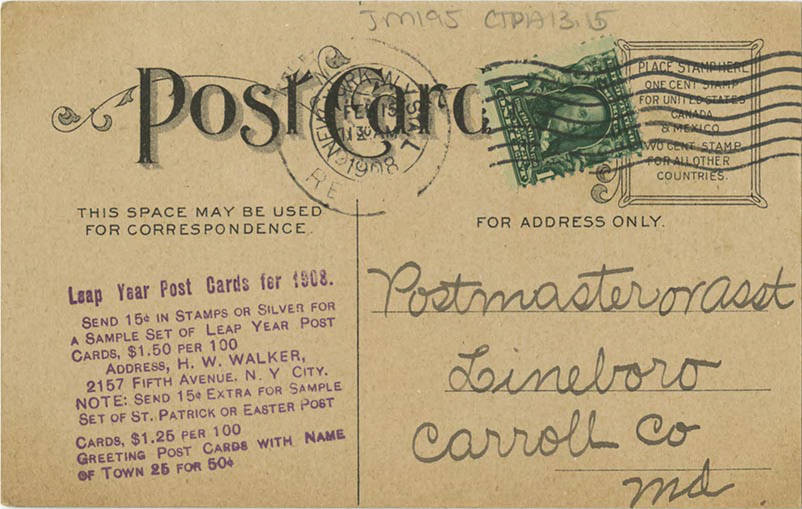The Intriguing History and Superstitions of the Leap Year

I
t's February 29th, making 2024 a Leap Year. The Leap Year is an incredible year for fans of the briar. An extra day to retreat into the comforts of our most cherished pipes and indulge in our favorite smokes is a splendid opportunity that only comes once every four years. The Leap Year, and Leap Days, have a complicated background in history and are a source of celebration in some cultures and simultaneously the cause for great concern in others. Pack your pipe and give it a light as we dive into the history of Leap Day.
Leap Day History

1908 Leap Year Post Cards
Today, Leap Days occur every four years to keep our calendar in line with the Earth's rotation around the sun, which also keeps our seasons ... well, in season. Without it, in time, December would be summertime in the United States. This is because every year is approximately 365.2421 days, or 365 days and 5 hours, 48 minutes, and 45 seconds. The bonus day rectifies the issue, meaning that our calendars won't be off by a day for another 3,000 years or so.
The Romans utilized a 23-day intercalary month, which they called Mercedonius, to sync the calendar with the solar year thousands of years ago. This month was observed within the month of February, and its placement was up to whoever was the ruler at the time. This tradition would result in the Roman calendar and the solar year no longer aligning properly. A typical Roman calendar year was 10 days shorter than our current years. They would be divided into lunar months, and at times, an extra month would be added to keep the calendar in line with the seasons.
It wasn't until 46 B.C. during Julius Caesar's reign that he chose to adopt the Egyptian calendar when he noticed that they based their calendars on the sun rather than the moon. Thus, Caesar consulted with Sosigenes, an Alexandrian astronomer, and decided to create his own new system: each solar year would be 365.25 days long. To address the discrepancy between the old calendar and the new Julian calendar, the first new year was 445 days long (talk about a never-ending year). This new calendar would take decades to be observed by the general public, yet the problem wasn't solved.
This is because an actual solar year isn't 365 days and 6 hours, or 0.25 days, long. This meant with every year, the days would be off by 11 minutes and 14 seconds, eventually adding to a 10-day error, an error that interfered with liturgical dates, such as Easter. Easter is set by the moon as it occurs on the first Sunday after the first full moon of the spring season, known as the "Pascal Full Moon." The Catholic church wanted to resolve this issue, so Pope Gregory XIII commissioned a new calendar called the Gregorian calendar in 1582 A.D., fixing Caesar's original miscalculation by having an extra day on February 29th every four years, except during centurial years not divisible by 400.
A typical Roman calendar year was 10 days shorter than our current years.
And so, that year, October 4th was followed by the 15th. This revised calendar is still in use to this day and will keep the count correct until around the year 4000, when the calendar will be a day off. The current calendar, however, is still 26 seconds ahead of the solar year. Before adopting this calendar in 1752, England was behind by 11 days. To rectify this error, Lord Chesterfield persuaded Parliament to adopt the Gregorian calendar. Since the Leap Day was not recognized until Chesterfield's Act in 1752, the day allegedly had no legal status, making all crimes technically legal on that day. Russia didn't adopt the Gregorian calendar until the 20th century.
Leap Day Superstitions

Leap Year Party
A plethora of superstitions and lore surround the Leap Day and the Leap Year around the world. The Greeks, Ukrainians, and Italians notably consider getting married on a Leap Day to be unlucky, many continuing this belief today. Starting something new, including getting into a relationship, engagement, or marriage during the Leap Year entirely is said to be bad luck; The fate of these relationships is believed to be doomed, ending in divorce or the death of a partner. In these same countries, including Taiwan, Leap Years in general are considered to be unlucky.
The current calendar, however, is still 26 seconds ahead of the solar year.
In Scotland, being born on a Leap Day is a terrible omen, signifying a life of suffering and sickness. Parents of children born on this day are superstitious that those children will be particularly hard to raise. Additionally, Scottish farmers believe that their livestock is worse on a Leap Year, as noted by the popular old saying: "A Leap Year was never a good sheep year." This superstition stems from the belief that a Leap Day throws off the whole calendar year, meaning that nature is thrown off as well, causing great issues with crops and livestock. Beans and peas planted that year are said to always grow the wrong way.
Not all cultures identify Leap Days as unlucky, though. In the United States, those born on a Leap Day, known as "Leaplings," are celebrated. Astrologists allegedly claim that those born on Leap Days are under the Pisces sign and possess unusual talents. This rare birthday signifies that anything started on that day is sure to be successful, including life. In Northern Italy, the city of Reggio Emilia has long believed that Leap Years are lucky for the birth of whales.
Scottish farmers believe that their livestock is worse on a Leap Year
Leap Day Customs

Leap Year Post Card
A variety of traditions take place on Leap Days across the world. In Parisian and English cultures, there is a sincere appreciation for the Leap Year. There are only around 5,000,000 people alive today worldwide who are "Leaplings," and only 187,000 people in the United States share this rare birthday. A town on the Texas-New Mexico border, Anthony, is known as the Leap Year capital of the world. During every Leap Year, a multi-day festival celebrates the day and those born on it, as noted on the festival's website, Anthony Texas Leap Year Festival.
"It's all thanks to its annual, multi-day Leap Year festival, which has its origins in the friendship between leaplings Mary Ann Brown and Birdie Lewis who pitched the idea to the town council in 1988." For 2024, the celebration kicks off on February 29th with a special, private dinner that is exclusive to "leaplings." The festivities continue on March 1st and 2nd.
During every Leap Day in France, a special newspaper is published, La Bougie du Sapeur, which translates to "The Sapper's Candle." This newspaper is based on a French comic book character made by George Colomb in 1896 called Camember, according to Country & Town House:
"An army soldier (or 'sapper'), Camember was born on 29 February and joined the army when he had celebrated his birthday four times. The tradition dates back to 1980, and a new edition has been published every 29 February since, typically selling in excess of 150,000 copies. Since 2016, La Bougie du Sapeur has also been sold in Belgium, Switzerland, Luxembourg and Canada."
only 187,000 people in the United States share this rare birthday.
In Taiwan, it is believed that the elderly are more likely to pass away during this time. Thus, some Taiwanese daughters return home on Leap Day customarily to make their parents a meal of pig trotter noodles, which are made with the meat from pig's feet. This meal is intended to bring health and good fortune to their aging parents.
One of the most notable customs on February 29th revolves around marriage and romance. In 5th century Ireland, Saint Brigid pleaded with Saint Patrick to allow women the opportunity to ask for a man's hand in marriage on February 29th. Saint Patrick designated this rare day as the one day women could propose. This has remained a popular tradition, known as Bachelor's Day, or Ladies Privilege. For the man who rejected a woman's proposal, a fine was expected, according to a blog post from Kinnaird Bagpipes and Reeds. "After receiving approval from Patrick for women to propose on Leap Day, Brigid then dropped to her knee and proposed to Patrick. Patrick declined but kissed her cheek and gave her a silk gown."
This tradition carried over into Scottish and English cultures. In England, men who reject the marriage proposal would owe the woman 12 fine gloves to hide her empty ring finger. In Scotland, in 1288, Queen Margaret passed a law stating that any man who rejected the proposal had to pay a fine or give the woman an item, ranging from a silk dress to a kiss. The woman would be expected to wear a red petticoat in order to propose, showing her intentions. In Finland, the Danish followed suit: any man who rejected would owe the woman fabric so she could fashion a skirt.
Saint Patrick designated this rare day as the one day women could propose.
Leap Day For The Pipe Smoker
Whether Leap Day is a bad or a good thing is up for debate across cultures. Here at Smokingpipes, it is a custom to spend the day wholly immersed in the art of pipe smoking. We highly recommend doing so, today more than ever, for luck to be on your side all year through. It is believed that the smoker who lights their pipe on Leap Day will be granted immunity from tongue bite, avoid discouraging bowl burnout, and experience more opportunities to smoke with others. The finding of rare, cherished tobacco is said to be at an all-time high for the discerning smoker during a Leap Year. For those who enjoy passing the time in the company of pipes, it is crucial to puff on a favorite tobacco on this most-lucky pipe-smoking day.
Hedge your bets and crack open that tin you've had aging in the cellar long enough, or go for a spooky blend, such as with Haunted Bookshop or Autumn Evening from Cornell & Diehl, in the spirit of superstitions. To avoid any bad omens that may fall upon you, smoke your pipe, relax, and meditate on the complex flavors that await. Purchasing 12 fine gloves in the case of an unwanted suitress is also recommended. However you choose to spend your Leap Day, we wish you nothing but happy smokes and good tidings on this rarest of days.
Bibliography
- Anthony Texas Leap Year Festival. (n.d.). Anthony Texas leap Year FestivalAnthony Texas leap Year Festival.
- Wood, S. (2024, February 27).5 things you may not know about leap day. History.com.
- Emily, O. (2024, February 27). 8 wacky leap year superstitions & traditions. Country and Town House.
- Fabry, M. (2016, February 29).Leap Year history: How leap day came to be.Time.
- Kinnaird Bagpipes.(n.d.)Leap Year Love Lorekinnairdbagpipes.com
- Werner, K. (2024, February 27).Leap year superstitions and traditions from around the world.The Independent.










Comments
After read this piece I feel so much smarter. Keep them coming.
Thank you Kayla, this was a fun and informative read, and nicely illustrated. I've become more aware of St. Brigid since this winter's Imbolg, but I had never before heard of an interaction between her and St. Patrick.